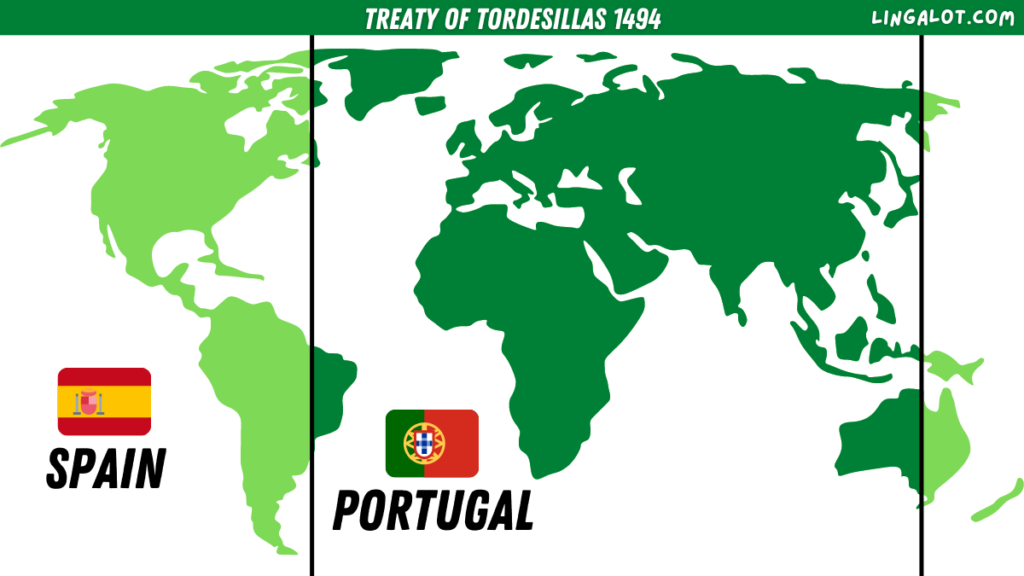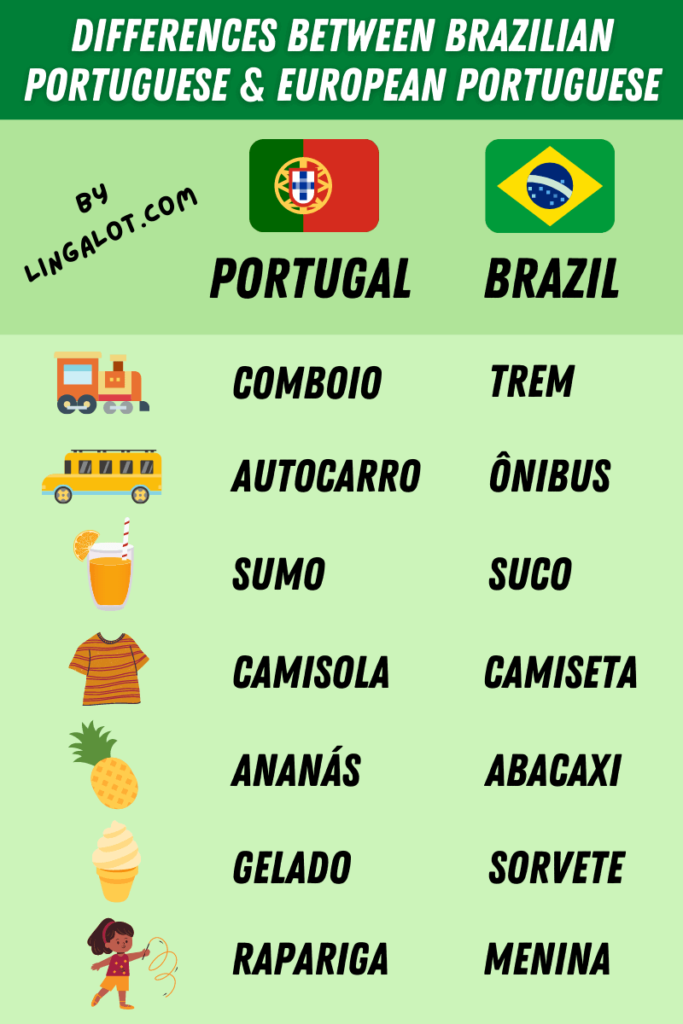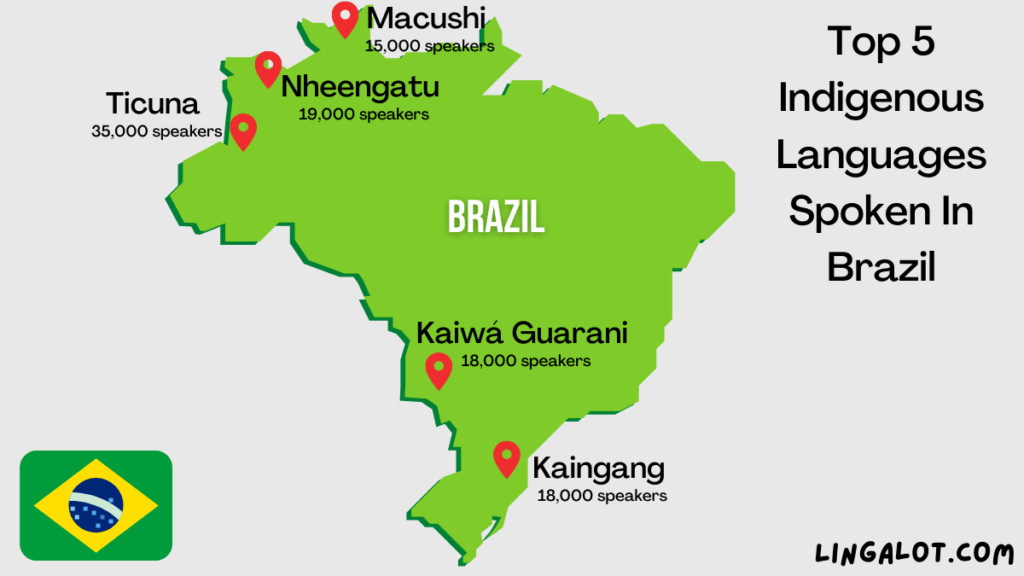You may be wondering what languages do they speak in Brazil? Is Brazilian a language?
The answer to that would be no, Brazilian is not a language but they do speak a distinct version of Portuguese that has been influenced by Brazilian culture and history over the years.
As well as Portuguese, a small minority of people in Brazil actually speak an indigenous language (more on these later).
Table of Contents
Why Do Brazilians Speak Portuguese?
Unlike most of its neighboring countries, Brazil does not speak Spanish. In fact, over 99% of Brazil’s population speak Portuguese natively.
This may come as a surprise as the majority of South America speak Spanish and you may be now asking yourself ‘why do Brazilians speak Portuguese and not Spanish?’.
After Christopher Columbus ‘discovered’ the Americas back in 1492, both Spain and Portugal raced over there to colonize these new lands.
2 years later, to avoid disagreements, Spain and Portugal decided to sign the Treaty of Tordesillas where essentially they drew a line down South America and gave Spain everything to the west of it and Portugal everything to the east.

This didn’t actually work out too well for Portugal as they only got a slither of South America (this slither turned out to be part of modern day Brazil).
Portugal went on to colonize these lands, bringing their language and culture with them.
Over time, Portuguese became the dominant language spoken in Brazil and the native languages used before largely fell out of use.
They expanded their lands in the late 1600s with Brazil becoming one of the most important colonies of the Portuguese empire for more than 200 years.
In 1822, Brazil became independent from Portugal but by then Portuguese was spoken by pretty much everyone.
Today Portuguese is both the official and national language of Brazil and is widely spoken by most of the population on a daily basis.
Is Brazilian Portuguese a Language?
A language is a structured form of communication whereas a dialect is just a regional version of a language.
Brazilian Portuguese is a distinct version of Portuguese that has several differences to European Portuguese but does it constitute a whole different language?
The answer is no, Brazilian Portuguese isn’t a language but it is a Portuguese dialect.
This means that the differences are small and someone from Portugal could easily understand someone from Brazil if they happened to bump into each other.
Most of the differences between them are variations in pronunciation and some differing vocabulary words and grammar.
A good comparison is American English and British English. These are clearly the same language as Americans and Brits can easily understand each other, however there are small differences in vocabulary and pronunciation.
For example, a British person might use the word ‘trainers’ to describe their shoes but it would be easy for an American to work out they mean ‘sneakers’ from context.
Additionally, if an American were to arrive in the UK they would have no difficulty in understanding the language as the differences are so minor. It’s the same with Brazilian Portuguese and European Portuguese.
How Brazilian Portuguese Differs From European Portuguese
After Portugal colonized Brazil, Portuguese eventually became the official language however over time, changes occurred in the Brazilian version of the language.
This was mainly due to an increase in contact with European and Asian immigrants as well as influence from the native languages already spoken in Brazil prior to the arrival of the Portuguese.
This means that, although the 2 are mutually intelligible, Brazilian Portuguese differs significantly from European Portuguese.
Brazilian and European Portuguese have slight differences in both grammar and vocabulary. There are more major differences in pronunciation.
Pronunciation Differences
Pronunciation is actually one of the biggest differences between Brazilian and European Portuguese.
Vowels
Brazilians tend to say vowels both longer and wider whilst Portuguese people tend to pronounce the words with a more closed mouth and don’t pronounce the vowels as much.
A good example is the word ‘telephone’. In Brazilian Portuguese the speaker would pronounce every vowel in the word and it would sound quite phonetic.
In Portugal, the first ‘e’ wouldn’t be pronounced so it would sound more like ‘tlefone’.
The Letter ‘S’
There is also a difference in how they pronounce the letter ‘s’ when it comes at the end of the word.
In Brazil, this ‘s’ is pronounced as an ‘s’ but in Portugal, it is pronounced as a ‘sh’ sound.
For example, the word ‘dois’, which means ‘two’ in English, would be pronounced as ‘doish’ in Portugal but as ‘doiss’ in Brazil.
The letter ‘L’
In Brazilian Portuguese, when an ‘l’ appears at the end of a word, it is pronounced like a ‘u’. In European Portuguese, it is pronounced as an ‘l’ similar to English.
For example, the word ‘papel’, which means ‘paper’ in English, would be pronounced as ‘pap-eh-u’ in Brazilian Portuguese but as ‘papel’ in European Portuguese.
The Letters ‘T’ and ‘D’
Another difference is the way they pronounce the letters ‘t’ and ‘d’.
In Portugal they are pronounced similar to English, however in Brazil, the ‘t’ is pronounced as ‘chi’ and the ‘d’ is pronounced as ‘gi’.
For example, in Brazil, the word ‘quente’, which means ‘hot’, would be pronounced as ‘kenchy’ but in Portugal it would be ‘kent-uh’.
There are several more pronunciation differences but these are the main ones.
Vocabulary Differences
There are several words that are completely different in Brazilian Portuguese and European Portuguese.
Below I’ve listed the most common ones.

- In Brazil, a train is ‘trem’ but in Portugal it is ‘comboio’.
- In Brazil, a bus is ‘ônibus’ but in Portugal it is ‘autocarro’.
- In Brazil, grass is ‘grama’ but in Portugal it is ‘relva’.
- In Brazil, a suit is ‘terno’ but in Portugal it is ‘fato’.
- In Brazil, ice cream is ‘sorvete’ but in Portugal it is ‘gelado’.
- In Brazil, juice is ‘suco’ but in Portugal it is ‘sumo’.
- In Brazil, a cup is ‘xícara’ but in Portugal it is ‘chávena’.
- In Brazil, sport is ‘esporte’ but in Portugal it is ‘desporto’.
- In Brazil, a pineapple is ‘abacaxi’ but in Portugal it is ‘ananás’.
- In Brazil, a cell phone is commonly referred to as ‘celular’ but in Portugal it is ‘telemóvel’.
- In Brazil, a refrigerator is ‘geladeira’ but in Portugal it is ‘frigorífico’.
- In Brazil, a t-shirt is ‘camiseta’ but in Portugal it is ‘camisola’.
- In Brazil, the color brown is ‘marrom’ but in Portugal it is ‘castanho’.
- In Brazil, a bathroom is ‘banheiro’ but in Portugal it is ‘casa de banho’.
- In Brazil, team is ‘time’ but in Portugal it is ‘equipa’.
- In Brazil, Santa Claus is known as ‘Papai Noel’ but in Portugal he is ‘Pai Natal’.
- In Brazil, concrete is ‘concreto’ but in Portugal it is ‘betão’.
- In Brazil, a girl is ‘menina’ but in Portugal it is ‘rapariga’.
There are some words you need to be careful with as they may mean different things in Brazil and in Portugal. The word ‘propina’ means ‘college tuition fee’ in Portugal however in Brazil ‘propina’ means ‘bribe’.
These differences can lead to confusion and mainly evolved due to cultural and historical differences over a long period of time.
Some of these words even derived from indigenous languages, for example, the word ‘abacaxi’ which means ‘pineapple’ in Brazilian Portuguese actually came from an old Tupi Guaraní language.
They are still essentially the same language and the vocabulary differences are small – it’s similar to the differences between American English and British English.
Grammar Differences
In general, Brazilian Portuguese is a lot less formal than European Portuguese.
In Brazil, the word ‘você’ is used to say ‘you’ in both formal and informal situations.
In Portugal, however, they only use ‘você’ in formal situations. In informal situations, they use the word ‘tu’ to mean ‘you’ instead.
Another grammar difference is that in Brazilian Portuguese, the pronoun tends to come before the verb. In contrast, in European Portuguese, the pronoun will usually come after the verb.
For example, to say ‘I love you’ in Portuguese, in Brazil the word order would be ‘I you love’ as the pronoun ‘you’ comes before the verb. In European Portuguese, the word order would be the same as English with the pronoun ‘you’ coming after the verb.
It’s also super common in European Portuguese to omit the personal pronoun altogether so they would commonly drop the ‘I’ in ‘I love you’.
There are several other grammar differences between Brazilian and European Portuguese but these are the main ones.
Popular Brazilian Words and Phrases
Below I’ve listed some of the most common Brazilian phrases and expressions that you’ll hear in Brazil.
- Legal – this word literally means ‘legal’ but is used in Brazil to say ‘cool’ or ‘great’.
- Eita – this word doesn’t have any meaning but it is used all the time in Brazil to express either satisfaction or fear.
- Beleza? – this word literally means ‘beauty?’ but in Brazil it is another way to ask someone how they are.
- E ai? – this short phrase literally means ‘and there?’ but is actually used to say ‘what’s up?’.
- Que saudade! – this Brazilian phrase is used when you miss something desperately.
- Fica à vontade – this Brazilian phrase literally means ‘be at your will’. It is used when someone enters your home, it’s like saying ‘make yourself at home’.
- Valeu – this Brazilian word literally means ‘it was worth it’ but is actually used as an informal way of saying ‘thank you’.
- Fala sério! – this phrase literally means ‘talk seriously’ but is used by Brazilians to say ‘you’re joking!’.
- Não tô nem ai – this phrase literally means ‘I’m not even there’ but is actually used to say ‘I don’t care’.
- Lindo maravilhoso! – this is a Brazilian saying that literally translates to ‘beautiful marvelous’. It’s used to talk about how beautiful and amazing something is e.g. the weather, a place etc.
As you can see from the phrases listed above, whilst Brazilian isn’t its own language, there are plenty of words and expressions that make Brazilian Portuguese distinct.
How Many Languages are Spoken in Brazil?
Brazilian Portuguese is the first language of the vast majority of people in Brazil and is actually both the official and national language. Portuguese is used in schools, the media, in business and in government.
Brazil is actually the most populous Portuguese-speaking country in the world with 211 million Portuguese speakers.
As well as Portuguese, there are numerous minority languages spoken throughout the country.
These include indigenous languages like Ticuna and Nheengatu as well as languages of European and Asian immigrants including Spanish, Italian, German and Japanese.
German is actually the second most spoken language in Brazil after Portuguese, with 1.9% of the population speaking it.
This is because back in the 1940s there was a huge amount of immigrants arriving in Brazil from Germany following 2 world wars.
In total, Brazil speaks around 228 different languages. Of these, 217 are indigenous languages however only approximately 170,000 people still speak these indigenous languages today.
Most Common Native Languages Spoken In Brazil

Before the Portuguese conquest of Mexico in 1500, believe it or not, nobody in Brazil spoke Portuguese.
At the time of the Portuguese’ arrival, there were between 6 and 10 million Amerindian people living in Brazil who spoke around 1,300 different languages!
Today only 217 of these languages remain with around 170,000 speakers total.
Among this small number of indigenous people, around 17% of them don’t speak Portuguese. These monolingual indigenous speakers mostly reside in isolated tribes.
Below I’ve listed the top 10 most spoken indigenous languages in Brazil and approximately how many people speak them today.
- Ticuna – 35,000
- Nheengatu – 19,000
- Kaingang – 18,000
- Kaiwá Guarani – 18,000
- Macushi – 15,000
- Terena – 15,000
- Guajajára – 13,000
- Xavante – 9,000
- Mawé – 7,000
- Tucano – 4,000
This list is by no means complete as there are 217 indigenous languages spoken in Brazil but these are the most spoken ones.
Ticuna
Ticuna is the most spoken indigenous language in Brazil with approximately 35,000 speakers.
Ticuna is a language isolate meaning that the language does not appear to be related to any of the other languages spoken in the region. It is also a tonal language.
Ticuna is spoken in the Amazon Basin which covers parts of Brazil, Peru and Colombia. There’s a total of 50,000 Ticuna speakers across the 3 countries.
It is the native language of the Ticuna people. Recently, there has been a big education push on getting more people to speak the language with textbooks being written by native Ticuna people.
In 2012, Brazil launched an educational campaign for the prevention of AIDS and violence against women. This was Brazil’s first campaign to be conducted in an indigenous language.
Nheengatu
Nheengatu is another one of the most spoken indigenous languages in Brazil and is still spoken by around 19,000 people in the Rio Negro region.
Nheengatu, which belongs to the Tupi-Guarani language family, emerged in the 18th century. It naturally evolved over many years from the ancient Amazonian Tupinambá language.
Today Nheengatu has actually been recognised as one of the four official languages of the municipality of São Gabriel da Cachoeira in northwestern Brazil.
Thanks for reading this post on the languages spoken in Brazil which answers the question ‘is Brazilian a language?’.
Although Brazilian isn’t a language itself, it’s clear that the languages spoken in Brazil are distinct and have their own twist.
The culture and history of Brazil has influenced the languages spoken there today including influencing its own dialect of Portuguese.
Related Posts:
